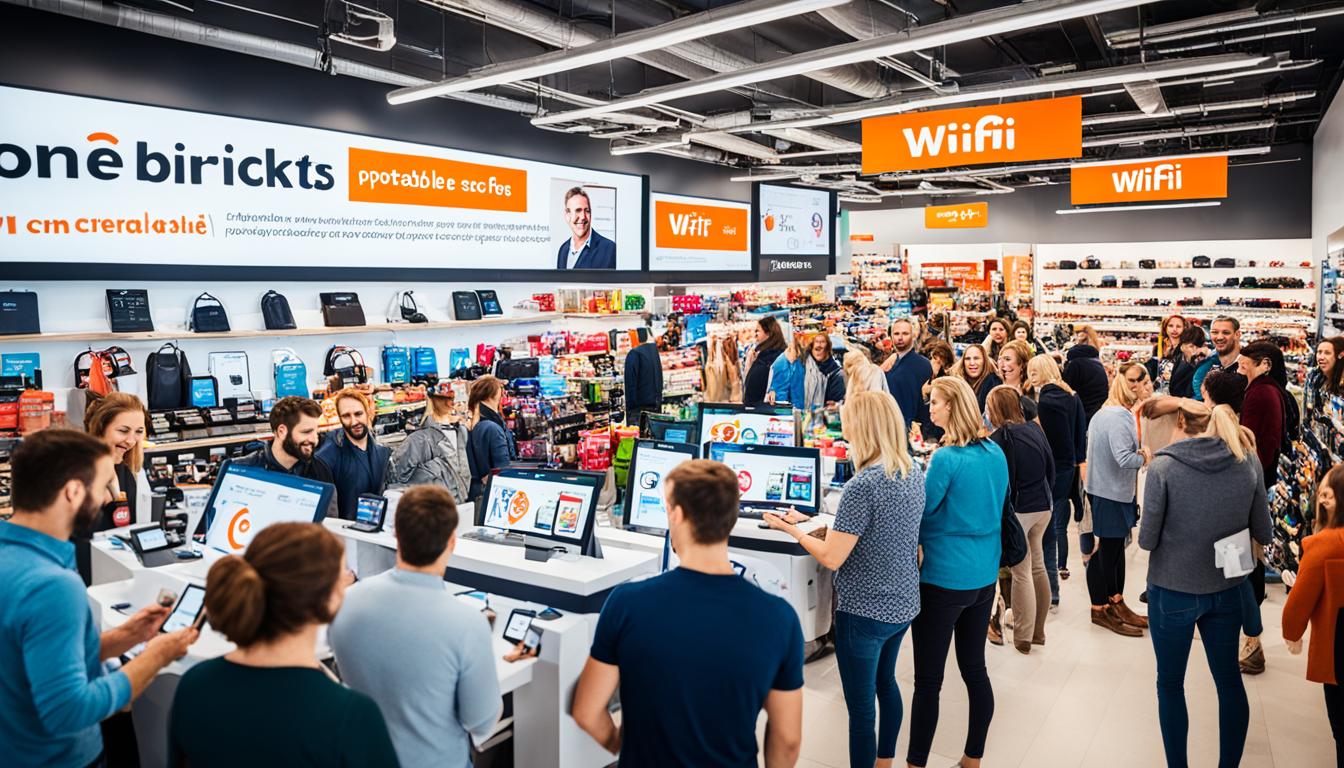Can portable WiFi mobile hotspots revolutionize the retail industry’s approach to corporate social responsibility?
In today’s digital age, the retail industry is constantly evolving to meet the demands of consumers who prefer online shopping and personalized experiences. To stay competitive, retailers are turning to innovative technologies that not only enhance the shopping experience but also contribute to corporate social responsibility (CSR) initiatives.
Portable WiFi mobile hotspots have emerged as a game-changer in the retail industry, reshaping the way retailers operate and interact with their communities. These devices offer enhanced connectivity within stores, ensuring seamless internet access for both employees and customers alike. But their impact goes beyond convenience and connectivity. Portable WiFi hotspots have the potential to bridge the digital divide, empower employees, and support community development initiatives.
In this article, we will explore the impact and benefits of portable WiFi hotspots in the retail industry’s CSR efforts. We will delve into case studies of retailers leveraging these devices to drive positive social impact. And we will discuss the challenges retailers face and the future outlook of portable WiFi technology in the retail sector.
Key Takeaways:
- Portable WiFi mobile hotspots are transforming the retail industry’s approach to corporate social responsibility.
- These devices provide enhanced connectivity for employees and customers, improving the shopping experience.
- Portable WiFi hotspots bridge the digital divide, promoting digital inclusion in underserved communities.
- Retailers can leverage portable WiFi technology to support community development initiatives and empower employees.
- Despite challenges, portable WiFi hotspots are set to become a standard tool in the retail industry’s CSR efforts.
The Benefits of Portable WiFi Hotspots in Retail
Portable WiFi hotspots offer numerous benefits to the retail industry. With reliable internet connectivity within stores, employees can access product information, manage inventory, and process transactions more efficiently, improving customer service and enhancing the overall shopping experience.
One of the key advantages of portable WiFi hotspots is the ability for retailers to offer free WiFi to customers. This creates opportunities for personalized marketing, targeted promotions, and increased customer engagement.
For both employees and customers, these devices bridge the digital divide by providing internet access in underserved communities. This promotes digital inclusion and equal access to online shopping and resources, making retail more accessible to a wider audience.
Here is a comparison of the benefits of portable WiFi hotspots in retail:
Stay Connected Anywhere with Our Favorite Portable WiFi Mobile Hotspot!
Experience seamless connectivity on-the-go with our portable WiFi mobile hotspot. Stay connected with high-speed internet wherever you are.
Stay connected on-the-go! Get your portable WiFi mobile hotspot today and enjoy reliable internet wherever you travel.
| Benefits for Retail | Benefits for Customers |
|---|---|
|
|
|

The Role of Portable WiFi Hotspots in CSR Initiatives
Portable WiFi hotspots play a vital role in the retail industry’s corporate social responsibility efforts. These devices provide internet access to employees, especially those in remote or underserved areas, which in turn improves job satisfaction, productivity, and work-life balance.
By fostering connectivity through portable WiFi, retailers empower their employees to stay connected and access information, education, and economic opportunities. This connectivity is especially crucial for brick-and-mortar stores in the retail industry, as it enables employees to efficiently communicate with customers, access real-time product information, and provide personalized service.
Furthermore, portable WiFi hotspots enable retailers to extend their CSR initiatives beyond their employees and into the community. Retailers can support various community development programs by providing internet access through portable WiFi. For example, they can collaborate with local educational institutions to offer digital literacy programs or provide access to online resources for students in underserved areas. This fosters digital inclusion and ensures that everyone has equal access to educational opportunities.
Moreover, portable WiFi hotspots can bridge the digital divide by bringing internet access to communities that lack reliable connectivity. This is particularly beneficial for brick-and-mortar stores in remote locations or areas with limited infrastructure. These hotspots allow retailers to reach customers in underserved communities, providing them with the ability to engage in online shopping and access a wider range of consumer goods and merchandise.
Therefore, the role of portable WiFi hotspots in retail’s corporate social responsibility initiatives is multi-faceted, benefiting both employees and the communities they serve. These devices empower individuals by fostering connectivity, enabling access to information and resources, and promoting digital inclusion in the retail industry and beyond.

Benefits of Portable WiFi Hotspots in CSR Initiatives:
- Improved job satisfaction and work-life balance for employees
- Enhanced productivity and customer service in brick-and-mortar stores
- Promotion of digital inclusion and equal access to online resources
- Support for educational programs and community development initiatives
- Bridge the digital divide and reach underserved communities
Role of Portable WiFi Hotspots in Community Development:
| Initiative | Impact |
|---|---|
| Digital literacy programs | Equipping individuals with essential digital skills |
| Access to online resources | Expanding educational opportunities and learning resources |
| Providing internet access in remote areas | Connecting underserved communities to online shopping and digital services |
Case Studies: Retailers Leveraging Portable WiFi Hotspots
Several retailers have recognized the potential of portable WiFi hotspots as an integral part of their corporate social responsibility (CSR) strategies. By incorporating these devices into their operations, retailers are harnessing the power of connectivity to create positive social impact in their communities.
Empowering Employees through Education and Training
One inspiring case study comes from a prominent retail store that implemented a program allowing its employees to borrow portable hotspots for accessing online training and educational resources. By providing employees with reliable internet connectivity, the retailer enables them to enhance their skills, unlock career advancement opportunities, and thrive in today’s competitive job market.
Facilitating Access to Online Shopping in Underserved Communities
Another commendable example is a retail brand that recognized the digital divide in underserved communities and took action. This retailer provides portable WiFi hotspots to these communities, empowering local businesses and residents to access online shopping and expand their economic opportunities. By bridging the connectivity gap, the retailer contributes to the digital inclusion and growth of these communities.
These case studies demonstrate the transformative potential of portable WiFi hotspots in the retail industry. By leveraging these devices, retailers can bridge the gap between their CSR initiatives and meaningful social impact. Whether it’s supporting employee development or empowering underserved communities with online connectivity, portable WiFi hotspots have the ability to reshape the retail industry’s approach to corporate social responsibility.
| Retailer | CSR Initiative | Impact |
|---|---|---|
| Retail Store A | Providing employees with portable hotspots for online training | Enhanced employee skills and career prospects |
| Retail Brand B | Distributing portable hotspots to underserved communities | Increased access to online shopping and economic opportunities |
Through these innovative initiatives, retailers are not only enhancing their brand image but also making a tangible difference in the lives of their employees and communities. Portable WiFi hotspots have become a catalyst for positive change in the retail industry, paving the way for a more connected and inclusive future.
Overcoming Challenges and Future Outlook
While portable WiFi hotspots offer significant benefits to the retail industry, there are challenges that need to be addressed to fully harness their potential. Some of these challenges include:
- Ensuring network security
- Managing data usage
- Addressing connectivity issues in remote areas
Network security is of paramount importance in the retail industry, where sensitive customer and transaction data are involved. Retailers need robust security measures to protect their networks from cyber threats and ensure data integrity.
Data usage management is another challenge that retailers face when using portable WiFi hotspots. Balancing the need for connectivity with the limitations of data plans requires careful monitoring and strategic allocation of resources.
Connectivity issues in remote areas can hinder the deployment of portable WiFi hotspots. Retailers operating in geographically dispersed locations must find innovative solutions to provide reliable internet access to their employees and customers.
Despite these challenges, the future outlook for portable WiFi hotspots in the retail industry’s corporate social responsibility initiatives is promising. As technology continues to evolve, these challenges can be overcome through advancements in network security, data management, and infrastructure development. Portable WiFi hotspots will likely become a standard tool in the retail industry, empowering brick-and-mortar stores to create seamless connectivity experiences for both employees and customers.
By leveraging the potential of portable WiFi technology, retail brands can enhance their CSR efforts, improve employee productivity, and bridge the digital divide in underserved communities. Here is a table highlighting the key challenges and their corresponding solutions:
| Challenges | Solutions |
|---|---|
| Network Security | Implement robust security measures such as firewalls, encryption, and regular vulnerability assessments. |
| Data Usage Management | Monitor data usage in real-time and implement data allocation strategies to ensure optimal utilization. |
| Connectivity in Remote Areas | Explore alternative connectivity options such as satellite internet or partnerships with local ISPs. |
As retailers overcome these challenges, portable WiFi hotspots will continue to revolutionize the retail industry, creating a more connected and inclusive shopping experience for all.
Conclusion
Portable WiFi mobile hotspots have transformed the retail industry by enabling innovative approaches to corporate social responsibility. These devices have revolutionized the shopping experience, providing reliable connectivity within stores and empowering employees with access to critical information. Retailers can now offer free WiFi to customers, facilitating personalized marketing and increased engagement. Moreover, portable WiFi hotspots bridge the digital divide, ensuring equal access to online shopping and resources in underserved communities.
By leveraging portable WiFi technology, retailers are not only improving employee productivity and work-life balance but also supporting community development initiatives. The ability to provide internet access to remote or underserved areas enhances job satisfaction, enables educational opportunities, and opens doors to economic growth. Through these initiatives, retailers demonstrate their commitment to corporate social responsibility and drive positive social impact.
As the retail industry continues to embrace portable WiFi hotspots, the future outlook is promising. While challenges such as network security and connectivity in remote areas exist, advancements in technology will address and overcome these issues. Portable WiFi hotspots are becoming an essential tool for retailers, creating a more interconnected and inclusive shopping experience. By embracing this transformative technology, retailers can strengthen their presence in the retail industry and contribute to a more socially responsible and inclusive society.

